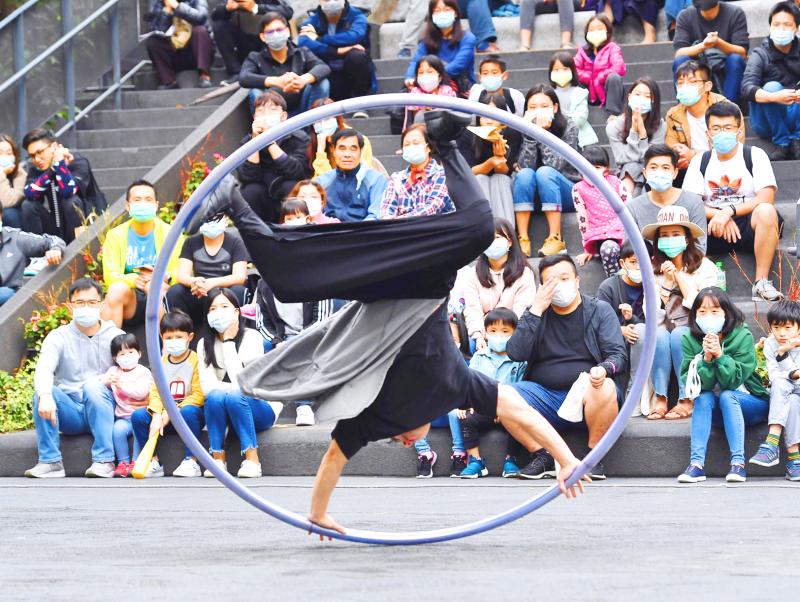Taipei Dangdai is presenting a new online initiative called “Taipei Connections” to bring together art galleries, collectors and artists as the COVID-19 pandemic is limiting opportunities for them to connect.
Developed in collaboration with Ocula, a contemporary art Web site that offers online access to artworks and exhibitions, Taipei Connections is to showcase a curated selection of “richly contextualized artworks” from leading galleries for the public from Saturday to Tuesday next week, organizers said.
Highlights in the first edition of Taipei Connections include works by Japanese photographer Daido Moriyama, Chinese painter Zeng Fanzhi (曾梵志), Austrian artist Erwin Wurm, and American artists Doug Aitken, Alex Katz and Al Held.

Photo: CNA
Risings stars in Asia such as Singapore’s Alvin Ong and Dawn Ng, and China’s Zhao Zhao (趙趙) and Lu Song (呂松) are also to be featured, organizers said.
Contemporary Taiwanese artists who are included are Ho Kan (霍剛), Li Yuan-chia (李元佳), Yao Jui-chung (姚瑞中), Tang Jo-hung (黨若洪), Liu Chi-hung (劉致宏), Yeh Shih-chiang (葉世強) and Cheng An-li (鄭安利).
Taipei Dangdai will also present a series of online events, including a Q&A session with Taipei Dangdai codirectors Magnus Renfrew and Robin Peckham, a virtual studio visit with artist Wu Chi-tsung (吳季璁) and a walkthrough of Wurm’s show at the Taipei Fine Arts Museum, which is on view until June 14.
The online platform builds on the Taipei Dangdai’s mission of creating an “open forum for art and ideas” beyond the walls of the fair, organizers said.
It is the “first step” in its effort to engage with audiences through digital platforms, they added.
“Conversations that start at a fair frequently conclude throughout the year and sometimes in other places,” Renfrew said. “As there are fewer opportunities within the current context for these follow-up encounters to happen in person, we want to provide a focal point that can allow conversations to continue virtually.”
While there is “no replacement for meeting in person,” Taipei Connections intends to serve as a bridge between galleries and collectors, Peckham said.
The second edition of Taipei Dangdai, held in January at the Taipei Nangang Exhibition Center, attracted more than 40,000 visitors, organizers said.
The art fair closed just before the COVID-19 epidemic began to spread outside of China, forcing major cultural events across Asia to postpone or cancel.

Chinese Nationalist Party (KMT) Chairman Eric Chu (朱立倫), spokeswoman Yang Chih-yu (楊智伃) and Legislator Hsieh Lung-chieh (謝龍介) would be summoned by police for questioning for leading an illegal assembly on Thursday evening last week, Minister of the Interior Liu Shyh-fang (劉世芳) said today. The three KMT officials led an assembly outside the Taipei City Prosecutors’ Office, a restricted area where public assembly is not allowed, protesting the questioning of several KMT staff and searches of KMT headquarters and offices in a recall petition forgery case. Chu, Yang and Hsieh are all suspected of contravening the Assembly and Parade Act (集會遊行法) by holding

PRAISE: Japanese visitor Takashi Kubota said the Taiwanese temple architecture images showcased in the AI Art Gallery were the most impressive displays he saw Taiwan does not have an official pavilion at the World Expo in Osaka, Japan, because of its diplomatic predicament, but the government-backed Tech World pavilion is drawing interest with its unique recreations of works by Taiwanese artists. The pavilion features an artificial intelligence (AI)-based art gallery showcasing works of famous Taiwanese artists from the Japanese colonial period using innovative technologies. Among its main simulated displays are Eastern gouache paintings by Chen Chin (陳進), Lin Yu-shan (林玉山) and Kuo Hsueh-hu (郭雪湖), who were the three young Taiwanese painters selected for the East Asian Painting exhibition in 1927. Gouache is a water-based

Taiwan would welcome the return of Honduras as a diplomatic ally if its next president decides to make such a move, Minister of Foreign Affairs Lin Chia-lung (林佳龍) said yesterday. “Of course, we would welcome Honduras if they want to restore diplomatic ties with Taiwan after their elections,” Lin said at a meeting of the legislature’s Foreign Affairs and National Defense Committee, when asked to comment on statements made by two of the three Honduran presidential candidates during the presidential campaign in the Central American country. Taiwan is paying close attention to the region as a whole in the wake of a

OFF-TARGET: More than 30,000 participants were expected to take part in the Games next month, but only 6,550 foreign and 19,400 Taiwanese athletes have registered Taipei city councilors yesterday blasted the organizers of next month’s World Masters Games over sudden timetable and venue changes, which they said have caused thousands of participants to back out of the international sporting event, among other organizational issues. They also cited visa delays and political interference by China as reasons many foreign athletes are requesting refunds for the event, to be held from May 17 to 30. Jointly organized by the Taipei and New Taipei City governments, the games have been rocked by numerous controversies since preparations began in 2020. Taipei City Councilor Lin Yen-feng (林延鳳) said yesterday that new measures by